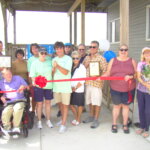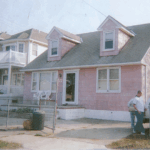Work resumed on the Wildwood Boardwalk reconstruction project, which had been stalled for weeks, on Thursday, Nov. 2, after a court hearing on whether there was a problem with the winning bid.
Phase III of a multiyear endeavor by the city and state to refurbish the famous oceanfront attraction came to a halt when a lawsuit brought by the project’s second-place bidder led a judge to issue a temporary restraining order, just as the old boards were being ripped up.
The suit named the city and its contractor as co-defendants and sought to have the court intervene and award the contract to the plaintiff.
Following a hearing Wednesday, Nov. 1, to determine if the restraining order should remain in place, a judge lifted it, allowing work on the boardwalk to resume with no further delay.
In a written decision issued hours after the hearing in Cape May County Superior Court, Judge Michael J. Blee also denied the request of the plaintiff, L. Feriozzi Concrete Co., of Atlantic City, which sought to have the judge compel the city to invalidate the contract and award it to them.

News of the lawsuit had alarmed business owners, the boardwalk management group and a local tourism organization, which collectively hired an attorney to argue the importance of the timely completion of the project.
This is the third year of the project. In prior years, the boardwalk opened just weeks before Memorial Day and the kickoff to the busy summer season, even though there were no impediments like the recent lawsuit.
After receiving word of the judge’s decision, Steve O’Connor, Wildwood’s business administrator, said the project should still be done on time. It is scheduled to be completed April 26, 2024.
“Barring any unsuspected long-term weather delays, the contractor is confident he can meet the current due date in the contract,” he told the Herald.
Restraining Order Lifted
The judge ruled against L. Feriozzi Concrete, which argued that the low bid submitted by competitor Fred M. Schiavone Construction, of Gloucester County, was fatally defective because it failed to name a subcontractor that would perform steel work.
In his decision, Blee wrote that Schiavone was not under a legal obligation to name a subcontractor, because the company will cut, prepare and install the material at issue – ornamental handrails, light poles and signage – on-site.
“With the exception of fabrication, the remaining functions will be performed by Schiavone,” Blee wrote. “The court does not find [Bluewater Welding’s] role as manufacturer elevates them as a custom fabricator that needs to be listed as a subcontractor.”

Blee also rejected Feriozzi’s argument that Schiavone is legally unqualified to do the structural steel work itself. The judge pointed out it was uncontested by all parties that state Department of Property Management and Construction qualifications, raised by Feriozzi, are not a legal requirement to perform the duties in the contract with the city.
The judge also said he was troubled by Feriozzi’s delay in filing for relief.
Defense Argument
During oral arguments, John C. Barnoski, a lawyer for the city, recalled the timeline from when the bid was awarded to Schiavone in September. On Sept. 11, Barnoski said, an email was sent by the Wildwood city clerk to several individuals with an agenda for the Sept. 13 Board of Commissioners meeting, indicating that the board was expected to award the boardwalk contract to Schiavone.
Later that day, Barnoski said, the owner of Feriozzi Concrete threatened litigation in a reply to the clerk’s email. “Hope everyone is ready for their deposition to be taken,” the email purportedly said. Two days later, on Sept. 13, the board went ahead and awarded the contract to Schiavone, despite Feriozzi’s threat of litigation.
Then, Feriozzi “sat on their rights,” Barnoski told the judge, waiting almost another month to file suit, Oct. 11.
In the suit Feriozzi pointed to a discrepancy in the bids Schiavone submitted last year and this year. In last year’s bid for Phase II of the project, a contract Schiavone won and performed, it named a structural steel subcontractor. However, in this year’s bid for Phase III of the project, a very similar job but on a different section of the boardwalk, Schiavone did not name a structural steel subcontractor, the suit said.
Barnoski argued that in its pleadings, Feriozzi admits the law it was suing under does not define the very term the case turns on, “structural steel.” He argued the subcontractor simply fabricates custom steel parts, like railings, that are not important to the structural integrity of the boardwalk.
The work making the parts is performed off-site and then Schiavone installs them, the city argued, making any company besides Schiavone involved in the steel work a supplier, not a subcontractor.
The city further argued that Feriozzi offered no certifications to support its claim that Schiavone is unqualified to self-perform the work. In certifications submitted with the city’s brief, an engineering firm attests to the quality of the work when Schiavone self-performed it last year on Phase II of the boardwalk reconstruction.
Arguing for Schiavone, attorney Vincent J. Pancari echoed many of the city’s arguments. He also said his client didn’t name a structural steel subcontractor because it had no legal obligation to do so and his client is qualified to perform the work.
Plaintiff’s Argument
Feriozzi attorney John F. Palladino argued that whether or not the city’s engineer approved of the work Schiavone did last year was meaningless legally. He said the court needed to apply the law, not be distracted by the “white noise” arguments of his adversaries.
“There’s a movie where they say, ‘They forgot to bring one thing, the evidence.’ Well, they forgot to bring one thing here,” Palladino argued. “Where’s the case they cite that says that a custom fabricator is not a subcontractor?”
He said the city and Schiavone were reaching by referring to the manufacturer as a supplier and that the project specifications go into great detail about how the ironwork has to be built.
“They’re not going to Home Depot. They’re not going to Lowe’s. Somebody is building this for the project, whether it’s built off-site or on-site. This is something specifically made for this project. It is not a normal supplier by any stretch of the imagination,” Palladino said.
He argued the court should consider the reasoning behind the law requiring public bidders to name subcontractors. He said it is an anti-bid-shopping law to protect the public entities going out to bid.
“You have to name the [subcontractor] so that you can’t, after the fact, go and negotiate prices from a position of power,” Palladino said. “So, what you gain by cheating the system is you get the lowest [bid] because you know you can negotiate afterwards.
“And instead of that price inuring to the benefit of the city, it inures to the benefit of the contractor. That’s why we have the requirement that you name your subcontractors.
“Who loses here is every taxpayer in the state. There’s a reason [anti-bid-shopping laws] need to be enforced, and that’s to protect the public.”
Intervention
The judge allowed an attorney, Douglas F. Johnson, to enter the case as an intervener, representing the interests of the Morey Organization, the Greater Wildwood Tourism Improvement & Development Authority, the Boardwalk Special Improvement District Management Corp. and 2701 Associates, the owner of parking lots being leased by the city for the project.
Johnson told the judge his clients were interested in the timeliness of the project’s completion because they would be affected if the boardwalk were not ready for the start of the tourism season.
Further delays could be a major hardship for his clients, he said. He added he didn’t favor one contractor over the other, but his clients wanted the job done on time no matter who was doing it.
Contact the author, Shay Roddy, at sroddy@cmcherald.com or 609-886-8600, ext. 142.









